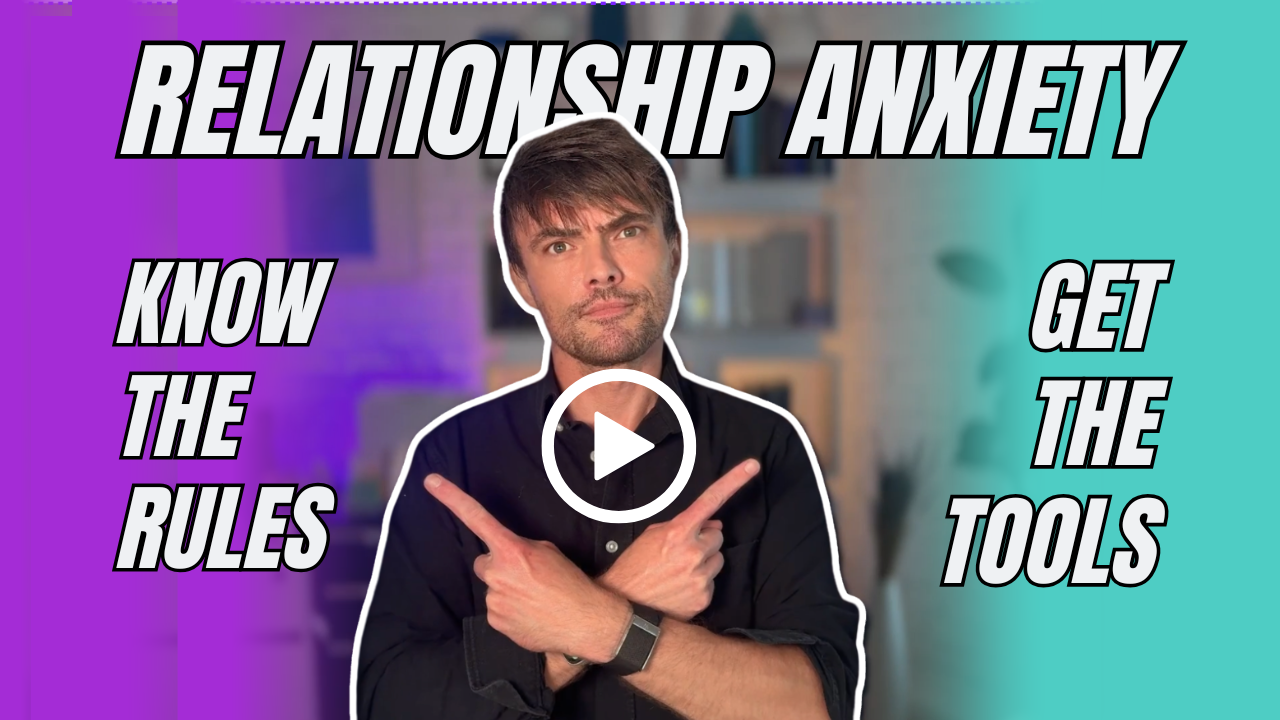Overthinking and Worry: Relationship Anxiety's Worst Trick
Sep 19, 2025
Here’s your schema wrapped in an HTML `
```
How to Stop Overthinking Relationships: Worry and Doubt
Overthinking is a feeling-avoidance habit dressed up as problem-solving. Name the “Doubt Dilemma,” stop chasing certainty, and run small, present-day experiments. Move from stewing to doing—feel first, then choose the next right action.
I'm Oliver, a psychotherapist in Los Angeles, and in my video I introduce a pattern I call the "Doubt Dilemma" — a sneaky form of relationship anxiety that turns harmless "what if" thoughts into a self-generated storm. This article expands on that idea, explains why those questions feel so urgent, and gives practical steps you can use right now to stop the spiral, reconnect with your feelings, and make clearer choices in your relationships.
To find out more about the ten rules of relationship anxiety- take the free quiz here.

What is the Doubt Dilemma?
The Doubt Dilemma is a pattern of intrusive, speculative thoughts that usually begin with "what if." They appear randomly— in the shower, driving to work, or right before you fall asleep— and they often seem harmless at first. Examples include:
- "What if they don't really love me?"
- "What if I don't really love them?"
- "What if I've made the wrong choice?"
These questions act like a loose thread on a sweater: you pull at them to smooth things over, and suddenly the whole garment unravels. The Doubt Dilemma isn't about gathering evidence; it's a habit of creating uncertainty where none needed to exist. In clinical terms, it often reflects inferential confusion: your brain makes leaps from a tiny thought to a catastrophic conclusion and then treats that conclusion as if it were fact.
Why "What If" Thoughts Are So Powerful
Our brains are built to make meaning. That's not a problem in itself—meaning-making lets us learn, plan, and connect. The problem comes when meaning-making runs away from us. "What if" thoughts are powerful because they:
- Create uncertainty out of thin air.
- Masquerade as reasonable questions.
- Activate anxiety, which then uses more thinking to demand more certainty.
When someone else gaslights you—convincing you that your perception of reality is wrong—it feels cruel and destabilizing. In the Doubt Dilemma, you become your own gaslighter. You introduce "tiny little fractures" in how you experience your relationship and then chase them, which only deepens the uncertainty and anxiety.

Uncertainty: Why It's the Real Threat
For many anxious people, uncertainty feels dangerous. The unknown rampages like a mental predator. But uncertainty is unavoidable. You will never have perfect answers to questions like "Is this the one?" or "Will this relationship last?" These are not crossword clues with a single correct solution.
Small uncertainties in daily life—Will the bus arrive on time?—are manageable. You can make simple plans to reduce the impact. Relationship uncertainty is different: it can feel corrosive because the answers are often not immediately available and sometimes never are. That vacuum invites rumination, and rumination invites behaviour changes that can actually sabotage the relationship.
How rumination reshapes behaviour
When you stew in "what ifs," you stop acting and start reacting. Common patterns include:
- Monitoring your partner's tone and behaviour for signs that confirm your doubts.
- Avoiding intimacy or emotional closeness "just in case" you're right.
- Provoking arguments to test whether your partner cares.
These behaviours create a feedback loop: the more you test, the more the relationship feels uncertain, which fuels more testing.
Doing vs Stewing: A Simple Distinction That Helps
One of the most helpful distinctions I offer is between doing and stewing.
- Doing is action-oriented and connected to feeling. Examples: calling a friend, walking the dog, touching your partner's shoulder, asking about their day, or actually processing the feelings you have about your partner—good, bad, and ugly.
- Stewing is cognitive rumination: replaying "what if" scenarios and worst-case stories in your head without taking emotional or behavioral steps. Overthinking is often a sign of under-feeling—you're avoiding uncomfortable feelings by staying in your head.
Feelings are data. If you feel hungry, that data tells you to eat. If you feel lonely, that data tells you to seek connection. Ignoring that internal data and replacing it with endless "what if" questions is not problem-solving—it's problem-generating.

Practical Steps to Break the Doubt Dilemma
Here are evidence-based, practical interventions you can use immediately to stop the "what if" spiral and start living more fully in your relationship.
1. Name it and step back
Pattern recognition is powerful. When you notice a thought that begins with "what if," label it. Say to yourself: "That's the Doubt Dilemma" or "That's a what-if thought." Naming reduces the thought's automatic power and creates a sliver of space to choose a response.
2. Disengage from the chase
Once you spot the pattern, don't chase it. You don't have to follow every mental rabbit hole. Practice a simple rule: if a thought is speculative and doesn't point to an actionable next step, put a bookmark on it and return to the present activity.
3. Move from thinking to feeling
Ask: "What do I feel right now about this person?" Add clarifying questions such as:
- Do I enjoy their company today?
- Does this relationship meet my needs in meaningful ways?
- Is there a concrete problem I can discuss with my partner or a professional?
These questions bring you back into data-gathering that includes emotions—not just an intellectual critique.
4. Behavioral experiments
Rather than trying to force certainty, run small experiments. If you fear your partner doesn't care, instead of provoking a fight to test them, try a vulnerability experiment: share a small, honest feeling and see how they respond. Track real data—what they actually say and do—rather than the story your anxiety invented.
5. Increase tolerance for uncertainty
Tolerating uncertainty is a skill you can develop. Techniques include:
- Mindfulness and grounding practices: notice sensations in the body when a "what if" pops up and breathe through them.
- Scheduled worry time: give yourself 10–15 minutes a day to entertain uncertainties so they stop hijacking the rest of your day.
- Gradual exposure: intentionally sit with small uncertainties and note you survive them.
- Therapy: a therapist can help you build distress tolerance and challenge inferential leaps.

When to Seek Help
If the Doubt Dilemma is persistent and reshaping your behaviour—leading to avoidance, testing, or chronic distance—consider professional help. A therapist can guide you through structured interventions like cognitive restructuring, behavioural experiments, and acceptance-based strategies to increase uncertainty tolerance.
Questions That Reframe Your Relationship Thinking
Instead of asking "What if I'm wrong?" or "What if this isn't right?", try reframing with these practical, present-focused questions:
- What do I feel about them today?
- Do I enjoy spending time with them now?
- Is there something concrete I need to communicate or change?
- Am I willing to go on one more date and see what happens?
These questions return you to the present and to data you can actually use.
Love Requires Partial Faith
Here's one of my central takeaways: love is always an act of partial faith. There is no guarantee, no complete certainty. Acting like certainty is necessary for love gives too much power to anxiety. If you stop chasing impossible answers, you might notice that your life is fuller and your relationship feels lighter. Ask yourself: "What if it is enough and I'm just not noticing?"
Quick Checklist: How to Respond the Next Time a "What If" Appears
- Spot the thought and name the Doubt Dilemma.
- Pause: breathe for 30 seconds and ground in the body.
- Ask a present-focused question ("What do I feel right now?").
- Choose an action (call a friend, go for a walk, talk to your partner, schedule worry time).
- Run a small experiment if there's a behaviour you'd like to test.
- If persistent, seek support from a therapist to build tolerance for uncertainty.
Final Thoughts
The Doubt Dilemma is less an enemy to defeat and more a trickster to recognize. Its power comes from convincing you that certainty is necessary for love. The truth is that love always involves risk and partial knowledge. You don't need perfect answers to stay in motion or to enjoy today.
If you're ready to learn more about the Ten Rules of Relationship Anxiety and where the Doubt Dilemma fits, I invite you to explore additional resources and consider a short quiz I developed that helps identify which anxiety rules show up for you. Small steps—spotting the thought, stepping back, connecting with your feelings, and experimenting—will shift your relationship from a place of testing and fear to one of curiosity and presence.
What might you notice if you stopped chasing an answer that no one can ever get? Maybe you'll discover that what you already have is enough, at least for today.
Resources: start by practicing the checklist above, try one behavioral experiment this week, and if you need support, reach out to a therapist who understands relationship anxiety.
FAQ: How to Stop Overthinking Relationships
Is overthinking a sign my relationship is wrong?
Not necessarily. Overthinking often reflects anxiety’s demand for certainty, not the quality of the relationship. Look at present-day data—your feelings, needs, and behaviors—before making big decisions.
What’s the fastest way to stop a “what if” spiral?
Name it (“Doubt Dilemma”), pause for 30 seconds, ask “What do I feel right now?”, and choose one small action (text a friend, take a walk, or share a simple feeling).
How do I tell anxiety from intuition?
Anxiety feels urgent, repetitive, and case-building; intuition is quieter and doesn’t demand constant checking. Treat intuition as one data point—then slow down and gather more real-world information.
What behaviors make overthinking worse?
Monitoring your partner for “signs,” provoking tests, and avoiding closeness. These create a feedback loop that increases uncertainty and doubt.
What should I ask myself instead of “What if I’m wrong?”
Try: “What do I feel about them today?”, “Do I enjoy our time now?”, “Is there something concrete to discuss or change?”, and “Am I willing to take one more small step?”
When should I see a therapist for relationship overthinking?
If rumination is persistent and reshapes your behavior—testing, distancing, or chronic doubt—structured help can build tolerance for uncertainty and reduce inferential leaps.
Can scheduled ‘worry time’ actually help?
Yes. Containing worry to a 10–15 minute daily window reduces hijacking and trains you to return attention to the present.

